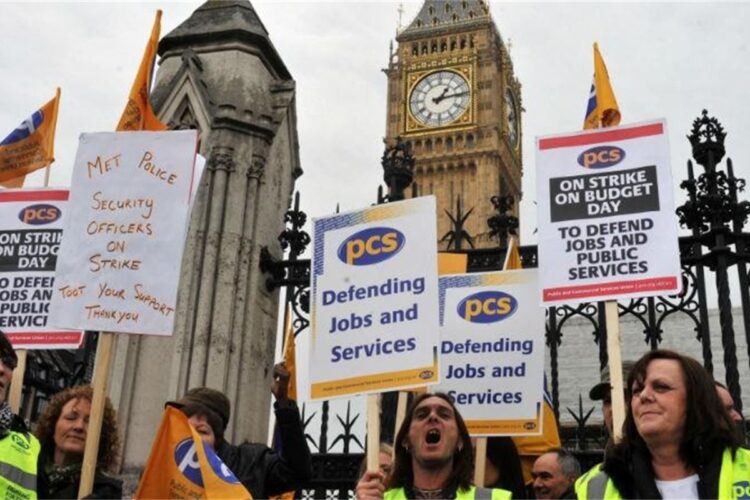By Ben Kerrigan-
An estimated 100,000 civil servants have voted to strike over pay and conditions, the Public and Commercial Services Union has announced.
The threshold for strike action was met in 126 areas, from border force officials to driving test examiners.
About half of the government departments and agencies balloted reached the 50 per cent turnout threshold required for strikes to go ahead, with almost nine in ten staff who voted lending their full support to industrial action. The spate of strikes happening and scheduled to happen in the days and weeks ahead confirm the level of discontentment with effectively falling wages, as inflation rises.
Strikes are expected to begin in December and last up to six months, with unions warning of “extraordinary disruption” to international travel, driving tests and government
Among the aggrieved are courts staff, Border Force, the passport office, DVLA and job centres across the Uk.
The PCS is calling for a 10% pay rise, better pensions, job security and no cuts to redundancy terms.
Details will be announced on 18 November if there are no “substantial” government proposals, the PCS said.
In a statement, PCS General Secretary Mark Serwotka said: “Our members have spoken and if the government fails to listen to them, we’ll have no option than to launch a prolonged programme of industrial action reaching into every corner of public life.”
The civil service helps develop and implement government policy, as well as providing services to people across the UK, including running prisons, employment services and paying benefits and pensions.
Mr Serwotka said that the pressure of the cost-of-living crisis, job cuts and office closures had meant workers had “reached the end of their tethers”.
The government said it regretted the decision and remained in “regular discussion with unions and staff”, adding that plans were in place to minimise potential disruption if strikes go ahead.
“The public sector pay awards are a careful balance between delivering value for money for the taxpayer and recognising the importance of public sector workers,” a spokesperson said.
The PCS, which represents workers employed by several British government departments, said an average of 86.2% of its balloted members voted for industrial action – the highest percentage vote in the union’s history.
It comes after government announced plans to reduces civil servant jobs by 91,000 and proposals to cut redundancy pay by an estimated 25.9%.
“Unless substantial proposals are received from the government the NEC will agree a programme of industrial action at its meeting on Friday,18 November,” the union, which represents civil servants who work in Whitehall, or in frontline services such as job centres, said.
The Associated Society of Locomotive Engineers and Firemen (ASLEF) union also announced on Thursday that train drivers working for 12 British operators will go on strike on 26 November in an ongoing dispute over pay.
Teachers in Scotland have also voted to strike, the country’s largest teaching union announced on Thursday.
The news follows an announcement by the Royal College of Nursing, on Wednesday, that nurses have voted to walk out over pay issues for the first time in its 106-year history
This, on top of the decision by teachers in Scotland who also voted to strike, the country’s largest teaching union announced on Thursday, means the government has to innovate seriously to improve economic conditions for brits in these challenging times of austerity.
One reality the government may not have realised yet is its need to cut down on defence spending, given the lofty amount it has already spent in supporting Ukraine against Russian aggression. The military support has been part of a collective pledge by Europe and NATO to send an important message to the bullish regime of the Kremlin, but there comes a time when measure and reflection is essential.
Image:PA




